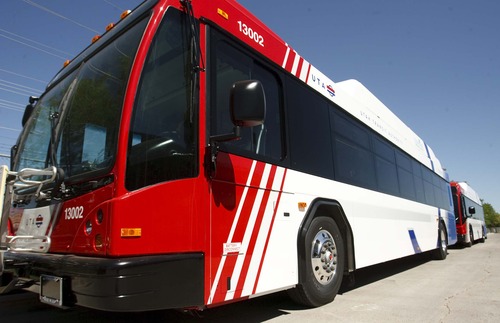This is an archived article that was published on sltrib.com in 2014, and information in the article may be outdated. It is provided only for personal research purposes and may not be reprinted.
Approving a big tax increase is rare in an election year. Still, legislators took the first step Wednesday toward hiking the sales tax for mass transit by a quarter-cent for every $1 purchase.
That would increase average current transit taxes by 42 percent — and generate an estimated $91.5 million more per year by 2016. Officials say the Utah Transit Authority would use funds from that to improve bus service, attract more customers and help reduce air pollution.
Legislators themselves would not raise the tax, which would help them avoid election-year attacks. The bill would allow counties and some cities to choose to put the proposal on the ballot, and then let voters decide.
The House Transportation Committee passed HB388 to start the process on a 9-1 vote, and sent it to the full House.
"As we've looked at air quality initiatives this year, it is my belief that this one will have the most significant impact and probably the most rapid impact," said committee Chairman Johnny Anderson, R-Taylorsville, sponsor of the bill.
He said the UTA estimates that the tax hike could increase overall transit service by 68 percent over five years, and increase ridership by 89 percent in that time.
Over five years, he said it could save 344,000 tons of emissions by taking up to 84,000 cars off the road every day.
Anderson and his co-sponsor, Rep. Joel Briscoe, D-Salt Lake City, said the process they are beginning would force UTA — or other transit authorities in Park City and Cache County — to carefully outline what they would do with money to win voter approval.
Their bill prohibits UTA, for example, from using any of the increase to extend its TRAX or FrontRunner lines, although it could be used to increase frequency of such train service. They said the tax aims mostly to increase bus service that was cut to afford expanding the rail systems just as the recession hit.
"We want to get back the routes we've lost, we want to get back the frequency that we've lost, and we know this is the way to do it," Anderson said.
"We're not running legislation so we can extend FrontRunner to Brigham City or Payson," Briscoe said. "We're not running this legislation to build a European railroad system up Big and Little Cottonwood canyons," but to improve bus service.
UTA said the money could allow it to increase the frequency or the span of service on 50 percent of current bus routes, and add five new "bus rapid transit" routes, which are sort of a TRAX on rubber wheels that often have special lanes in roads. It says it could also increase TRAX and FrontRunner service by 20 percent, including on weekends and evenings.
Some critics of UTA cheered provisions of the bill pushing more bus service.
Rep. Janice Fisher, D-West Valley City, said people in her area "need a lot of bus routes that have been eliminated," and hoped for even stronger guarantees that is where the money will go.
Steve Erickson, representing the Crossroads Urban Center that serves the poor, said, "We'd love to see UTA focus on being a good bus company rather than a railroad corporation or a real-estate development powerhouse," referring to its recent involvement in "transit-oriented developments" near train stops.
The bill was endorsed by a long parade of groups including the Salt Lake Chamber of Commerce, the Utah Division of Air Quality, Snowbird ski resort, mayors of Riverton and Salt Lake County and a variety of clean air groups.
It was opposed by the Utah Taxpayers Association. "It is a tax increase, pure and simple," said its vice president, Royce Van Tassell. "This does have a real impact."
Areas served by the UTA now charge an average 0.6 cent per dollar in sales tax for transit, ranging from 0.69 percent in Salt Lake County to 0.53 percent in Utah County. So the increase of a quarter cent would raise the average to 0.85 cents per dollar, a 42 percent increase.
The transit tax is a tiny share of the overall sales tax, which varies from area to area. The overall sales tax in most parts of Salt Lake County is currently 6.85 cents per dollar. The increase would take it to 7.05 cents.
UTA officials last year told legislators they would need to increase transit taxes to an average of 1 cent per dollar to afford all high-priority projects on the state transportation plan for 2040.



